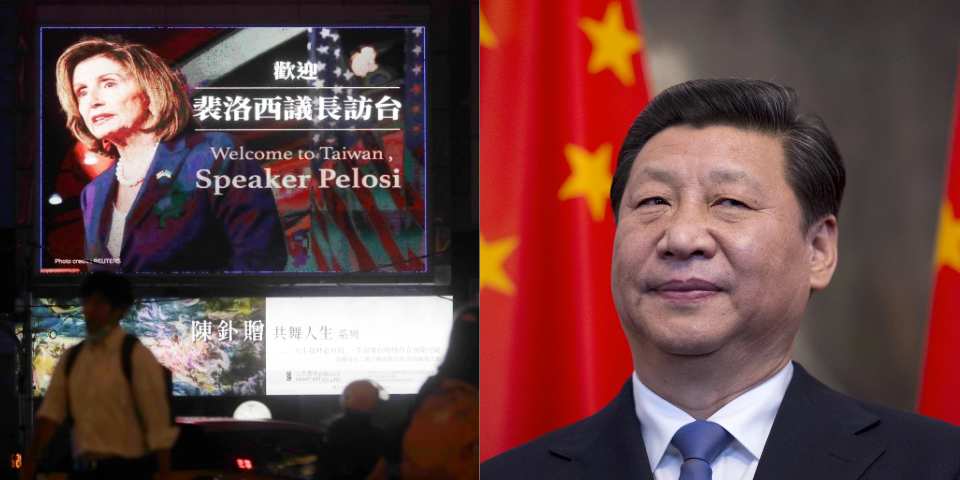Nancy Pelosi has stopped by Taiwan , and China’s all angry about it. But why? On August 2, 2022, U. S.
House Speaker Pelosi became the highest-ranking American to visit Taiwan in 25 years – a move which pissed off Chinese officials. For those unfamiliar with the situation, China has long seen Taiwan as a part of itself, even if the island has been self-ruled for decades. Thusly, a visit by such a high-ranking official was sure to send a message to the Chinese government of an unwillingness by the U.
S. to acknowledge this relationship, and in turn, China was sure to take some sort of offense by seeing the visit in the same light. In response, China announced a series of military exercises, which were in fact slated to take place in the event that Pelosi followed through with her intentions to visit Taiwan, which she did.
The China People’s Liberation Army announced that these exercises would take place in the waters and skies nearby Taiwan, and include the deployment of long-range ammunitions in the Taiwan Strait. Of course, these exercises (some of which are set to continue until the end of the week), will be taken as nothing more than intimidation tactics by China against both the U. S.
and Taiwan, although the reality of it all will no doubt be quite frightening for those living closer to where these drills are taking place. It’s no secret that the U. S.
and China currently enjoy a frosty relationship, with both superpowers constantly attempting to outdo each other on the global economic front. With regards to the visit, the Biden administration has insisted that it has not moved on its “One China policy” , which maintains strategic ambiguity regarding Taiwan, or in simpler terms, the U. S.
does recognize the overall sovereignty of Beijing (one Chinese government), but will continue to have informal relations (including defensive cooperation) with Taiwan. However, the nature of Pelosi’s visit, as well as the ostensible underlying intent – will have probably caused the Xi Jinping-led administration to become more than a little peeved. For a while now, Nancy Pelosi has been quite vocal about showing support for countries with democracy problems, namely nations ruled by dictators and autocrats.
In 1991 as a junior member of Congress, she made a show of pro-democracy demands in Tiananmen Square – only two years after Chinese authorities violently suppressed mass pro-democracy protests in that very venue. Her visit also comes as part of a larger tour of Asia which included plans to visit countries such as Singapore, Malaysia, Japan, and South Korea. This probably would not have sat well with Chinese officials either, especially when they’ve made huge strides to strengthen their presence in Southeast Asia in recent years.
As for President Biden’s administration, it was made clear that Pelosi was free to make her own decisions for the tour, even if the head of state himself had initially seemed wary about such a move. It’s hardly surprising that many – especially those in Asia – are looking at the visit and anticipating a heated aftermath, with both China and the U. S.
mobilizing military forces for different reasons. While China – as mentioned previously – has deployed forces for the purposes of intimidation and showing its contempt towards the visit, the U. S.
has also shown increased movement in the Southeast Asia region , with an aircraft carrier and a strike group spotted in the Philippine Sea on Monday. The aircraft carrier USS Ronald Reagan, alongside two other military ships had left Singapore, and were moving back towards their home base in Japan. While the shows of strength from both countries may seem concerning, it’s worth remembering that armed conflict between China and the U.
S. in the Asia Pacific is still very much something both would like to avoid for obvious reasons: The economic costs and mortality rates would be devastating, and there’s always the possibility of the rest of the world being thrown into military conflict. In Southeast Asia, various countries also enjoy complex economic and political relationships with both superpowers, and it’s not hard to envision that such ties could see various scenarios play out in the event of more abrasive maneuvers between the two.
For instance, the U. S. has enjoyed an enduring economic relationship with countries such as Singapore and the Philippines , while China has also strengthened its presence in the region via projects like the Belt and Road Initiative (BRI) .
Should things continue to sour between both nations, however, governments in Southeast Asia that have long enjoyed walking an easy tightrope by working with both nations would be left with plenty to worry about. However, many still hope that both sides would perhaps be a little less incendiary in their dealings with and regarding Taiwan – especially since the relationship between both nations are so strained. No matter how much both sides would like to avoid a military fight, it’s clear that the amount of pride shown by both may yet be more than enough reason to spark off some kind of conflict.
We can continue to hope that that doesn’t happen, and least of all in this part of the world. S’porean BMW driver scrapes Johor prince’s EV. Walks away like nothing happened.
Traveller from Bali gets fined US$1,874 for bringing McDonald’s to Australia S’pore expat comes up with quirky & hilarious baby names inspired by Lion City Despite male-sex ban review, here’s why Singapore probably won’t allow gay marriage Woman brags about her husband’s high income online, ends up getting him suspended Cover image sourced from Al Jazeera and Slate . .
From: mashable
URL: https://sea.mashable.com/life/21026/pelosis-taiwan-visit-why-is-it-such-a-big-deal-and-why-is-china-so-pissed
